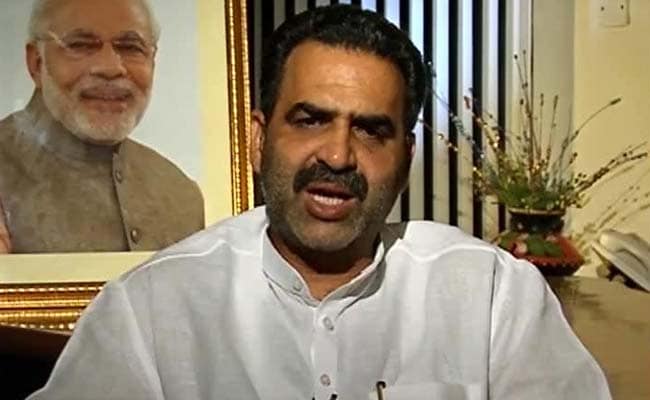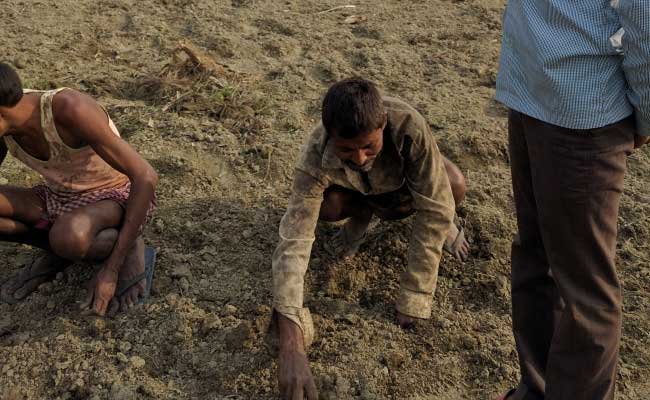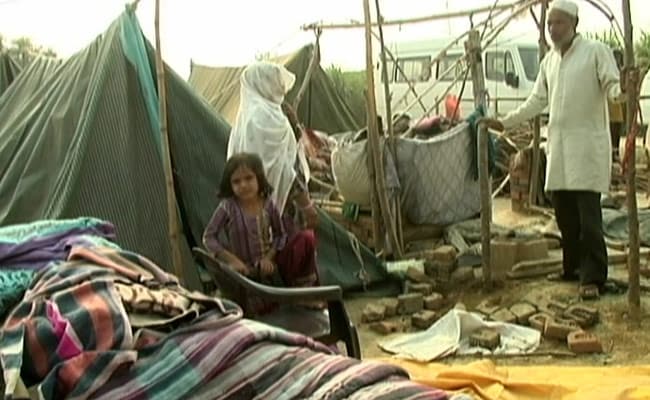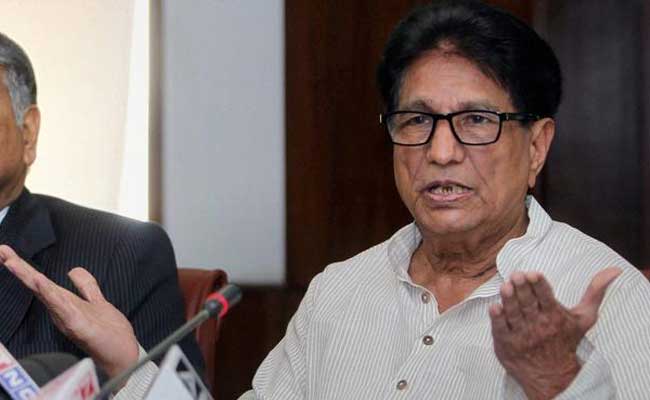
UP Polls: Jats, seared by Muzaffarnagar riots, feel Ajit Singh may be spent force, consider backing BJP
- Jats supported Ajit Singh for years, but backed BJP in 2014
- Feel "used" in Muzaffarnagar communal violence, angry with notes ban
- Now many see Ajit Singh as spent force, say may back BJP again
Did our AI summary help?
Let us know.
Muzaffarnagar:
At a gathering of party workers in Western Uttar Pradesh in his constituency in Jat-dominated Shamli last week, controversial BJP legislator Suresh Rana announced that if re-elected, he will introduce a curfew in the Muslim-dominated towns of Kairana, Deoband Moradabad and Rampur. The change, he promised, would be made on March 11, which is when the results of state elections including UP are to be declared.
In an interview soon after, Suresh Rana insisted his comment did not imply action against Muslims; he said he was simply talking of curfew as a means to improving law and order in high-crime zones.
The MLA was loudly cheered by the nearly 2,000 people inside the meeting hall, but outside, the legislator's speech was quickly dismissed as irrelevant. Few people we spoke to wanted to comment on the promise of banning mechanical slaughter houses and investigating the "exodus" of Hindus from places like Kairana made in the BJP's manifesto.
Among the Jats, there was much more excitement about the assurance made by the MP from Muzaffarnagar and prominent Jat leader Sanjiv Balyan, who was also present at the meeting, said that payments to sugarcane farmers, which sugar mills often take up to a year to disburse, will be paid within 14 days if the BJP is elected (it has not governed UP for 15 years).
 It appeared that many in the crowd at Mr Rana's meeting, which included Jat farmers, were less willing to subscribe to an agenda based on religion than in the recent past.
It appeared that many in the crowd at Mr Rana's meeting, which included Jat farmers, were less willing to subscribe to an agenda based on religion than in the recent past.
Jats form 17% of the population in Western UP, which holds 77 of the state's 403 seats; the community is seen as deciders of about 50 seats.
For years, the community backed Ajit Singh and his Rashtriya Lok Dal or RLD, which was a part of Dr Manmohan Singh's coalition government. Just before the general election, the UPA decided to add Jats from Uttar Pradesh in the list of Other Backward Classes entitled to central government reservations. But both Ajit Singh and his son Jayant Choudhary lost the election. Young Jats, disinterested in being told that government or better-paying farming jobs were a big new opportunity, were motivated by the development, manufacturing and other promises that Narendra Modi so articulately made as the BJP's presumptive Prime Minister.
But now the community is frustrated, pointing to the large protests by Haryana Jats last year, which left about 19 people dead and nearly 170 injured, but failed to entitle them to a solid share of government jobs and seats in educational institutions.
 There are other complaints - bigger ones. Jeetender Singh, a small farmer from the village of Pinna on the outskirts of Muzaffarnagar town, hoped that with some accumulated savings, he would be able to start a small hardware business, but the continuing agricultural distress, made more acute by demonetization, has piled him with debt. "We had expected sugarcane prices to go up to between Rs 350-500 per quintal from the present rate of Rs 280, but it did not happen. Meanwhile, sugar mills continue to delay our payments despite being given interest-free loans by the government," he said. Then came the shocker of demonetization. "It severely hurt our incomes. We were forced to sell jaggery for less than Rs 2,500 a quintal against the expected price of Rs 3,400," said the farmer.
There are other complaints - bigger ones. Jeetender Singh, a small farmer from the village of Pinna on the outskirts of Muzaffarnagar town, hoped that with some accumulated savings, he would be able to start a small hardware business, but the continuing agricultural distress, made more acute by demonetization, has piled him with debt. "We had expected sugarcane prices to go up to between Rs 350-500 per quintal from the present rate of Rs 280, but it did not happen. Meanwhile, sugar mills continue to delay our payments despite being given interest-free loans by the government," he said. Then came the shocker of demonetization. "It severely hurt our incomes. We were forced to sell jaggery for less than Rs 2,500 a quintal against the expected price of Rs 3,400," said the farmer.
Critics of the BJP say that it is as a counter-foil to the complaints about demonetization, and anger over reservation, that the party appears to be risking anew communal politics in Western UP, where, just three years ago, nearly 80 people were killed and thousands left homeless in Jat-Muslim violence in districts like Muzaffarnagar and Shamli. Muslims were left fearful, Hindus felt alienated, and after decades of living alongside each other, towns witnessed the exit of the community that was in the minority.
The next year, in the general election, the BJP triumphed in Uttar Pradesh, with a trophy of 71 of the 80 parliamentary seats.
The landscape has been changed irreversibly by the riots of Muzaffarnagar. Of the 567 First Information Reports or police cases filed after the violence, the majority involve young Hindu Jats, who feel they have since been abandoned by leaders to fend for themselves in court. Some are still in jail; others were released after their khaps collected money to pay off the police, or, in a few cases, threatened victims into dropping charges.
 About 100 FIRs are centred in Lisad, a village in Shamli district, where 13 Muslims were killed. "Our boys could not apply for government jobs," claims Balbir Malik, the father of an accused. His son was preparing to take an entrance exam for the Indian Railways, but "with a case against him, he could not appear for it. Everyone says, the violence destroyed the Muslims; it was bad for us too."
About 100 FIRs are centred in Lisad, a village in Shamli district, where 13 Muslims were killed. "Our boys could not apply for government jobs," claims Balbir Malik, the father of an accused. His son was preparing to take an entrance exam for the Indian Railways, but "with a case against him, he could not appear for it. Everyone says, the violence destroyed the Muslims; it was bad for us too."
A widespread fallout of the riots was the complete breakdown of the village economy. Of Lisad's 323 Muslim families, only one has returned home in the last three years. Rajinder Chowdhury, the son of a prominent Khap leader, who was accused in 36 cases of arson and murder says, that after the Muslims fled, there was no one left to work in their fields, no masons, blacksmiths or carpenters. "We have to now rely on outsiders from eastern UP and Bihar for labour," he said.
In villages like Lisad, where Jats are the most prosperous community, Mr Chowdhury claims that an even bigger loss involved the loans given to Muslims that remain unrecovered. "They regularly took advances from us and repaid it over time. But now there is no way we can get the money back. The village has lost around Rs 1 crore. Who is going to compensate us for it?" he asks. The neighbouring village of Phugana mirrors a similar story. The 250 Muslim families from here moved away after 16 of their men were killed and six women allegedly gangraped during the riots. Jat landlords say the families that left owed lakhs. "How can anyone think they will come back here after what was done to them?" says a primary school teacher who did not want to be identified. "Things will never be the same in Phugana."
"That's why today, there is a feeling amongst the Jats of Western UP that the BJP deliberately made them fight the Muslims for electoral gains. So the impact of communal mobilization this time will be limited, despite the efforts of their leaders," believes political analyst Sudha Pai.
 Sensing their growing disillusionment, a section of Jat leaders, the most prominent of whom is Ajit Singh, are circling back over and over to making the point of the BJP's failure to provide reservations for the community and the impact of demonetization on their livelihood.
Sensing their growing disillusionment, a section of Jat leaders, the most prominent of whom is Ajit Singh, are circling back over and over to making the point of the BJP's failure to provide reservations for the community and the impact of demonetization on their livelihood.
The Jats have never voted with the Dalits, who they look down on, or supported Mayawati's BSP (whose Jatav core base is strong in Western UP). They do not appear enthusiastic about the Samajwadi Party-Congress front, which they see as more focused on the Muslim vote. While they believe Ajit Singh will take up the concerns of farmers more stridently than anyone else, many see the 77-year-old as a spent force. In 2012, the RLD contested 40 seats in Western UP, but managed to win only nine, performing so poorly in the others that it forfeited its deposit in 20 constituencies. Besides, Ajit Singh's party has also put up a large number of Muslim candidates in the region - and this, some Jats feel, leaves them with no choice but to support the BJP again. "That does not mean we are all communal or totally satisfied with the BJP government's performance at the Centre. But no other party is putting us first," is a common refrain we heard in the Jat heartland.
In an interview soon after, Suresh Rana insisted his comment did not imply action against Muslims; he said he was simply talking of curfew as a means to improving law and order in high-crime zones.
The MLA was loudly cheered by the nearly 2,000 people inside the meeting hall, but outside, the legislator's speech was quickly dismissed as irrelevant. Few people we spoke to wanted to comment on the promise of banning mechanical slaughter houses and investigating the "exodus" of Hindus from places like Kairana made in the BJP's manifesto.
Among the Jats, there was much more excitement about the assurance made by the MP from Muzaffarnagar and prominent Jat leader Sanjiv Balyan, who was also present at the meeting, said that payments to sugarcane farmers, which sugar mills often take up to a year to disburse, will be paid within 14 days if the BJP is elected (it has not governed UP for 15 years).

Sanjeev Balyan, a Muzaffarnagar MP, is asking for votes in the name of development this time
Jats form 17% of the population in Western UP, which holds 77 of the state's 403 seats; the community is seen as deciders of about 50 seats.
For years, the community backed Ajit Singh and his Rashtriya Lok Dal or RLD, which was a part of Dr Manmohan Singh's coalition government. Just before the general election, the UPA decided to add Jats from Uttar Pradesh in the list of Other Backward Classes entitled to central government reservations. But both Ajit Singh and his son Jayant Choudhary lost the election. Young Jats, disinterested in being told that government or better-paying farming jobs were a big new opportunity, were motivated by the development, manufacturing and other promises that Narendra Modi so articulately made as the BJP's presumptive Prime Minister.
But now the community is frustrated, pointing to the large protests by Haryana Jats last year, which left about 19 people dead and nearly 170 injured, but failed to entitle them to a solid share of government jobs and seats in educational institutions.

Farmers in western UP are coping with crash in farm prices after demonetisation
Critics of the BJP say that it is as a counter-foil to the complaints about demonetization, and anger over reservation, that the party appears to be risking anew communal politics in Western UP, where, just three years ago, nearly 80 people were killed and thousands left homeless in Jat-Muslim violence in districts like Muzaffarnagar and Shamli. Muslims were left fearful, Hindus felt alienated, and after decades of living alongside each other, towns witnessed the exit of the community that was in the minority.
The next year, in the general election, the BJP triumphed in Uttar Pradesh, with a trophy of 71 of the 80 parliamentary seats.
The landscape has been changed irreversibly by the riots of Muzaffarnagar. Of the 567 First Information Reports or police cases filed after the violence, the majority involve young Hindu Jats, who feel they have since been abandoned by leaders to fend for themselves in court. Some are still in jail; others were released after their khaps collected money to pay off the police, or, in a few cases, threatened victims into dropping charges.

Relief camps for Muzaffarnagar riot victims (December 2013)
A widespread fallout of the riots was the complete breakdown of the village economy. Of Lisad's 323 Muslim families, only one has returned home in the last three years. Rajinder Chowdhury, the son of a prominent Khap leader, who was accused in 36 cases of arson and murder says, that after the Muslims fled, there was no one left to work in their fields, no masons, blacksmiths or carpenters. "We have to now rely on outsiders from eastern UP and Bihar for labour," he said.
In villages like Lisad, where Jats are the most prosperous community, Mr Chowdhury claims that an even bigger loss involved the loans given to Muslims that remain unrecovered. "They regularly took advances from us and repaid it over time. But now there is no way we can get the money back. The village has lost around Rs 1 crore. Who is going to compensate us for it?" he asks. The neighbouring village of Phugana mirrors a similar story. The 250 Muslim families from here moved away after 16 of their men were killed and six women allegedly gangraped during the riots. Jat landlords say the families that left owed lakhs. "How can anyone think they will come back here after what was done to them?" says a primary school teacher who did not want to be identified. "Things will never be the same in Phugana."
"That's why today, there is a feeling amongst the Jats of Western UP that the BJP deliberately made them fight the Muslims for electoral gains. So the impact of communal mobilization this time will be limited, despite the efforts of their leaders," believes political analyst Sudha Pai.

Ajit Singh, RLD chief, is trying to woo the Jat voter away from the BJP
The Jats have never voted with the Dalits, who they look down on, or supported Mayawati's BSP (whose Jatav core base is strong in Western UP). They do not appear enthusiastic about the Samajwadi Party-Congress front, which they see as more focused on the Muslim vote. While they believe Ajit Singh will take up the concerns of farmers more stridently than anyone else, many see the 77-year-old as a spent force. In 2012, the RLD contested 40 seats in Western UP, but managed to win only nine, performing so poorly in the others that it forfeited its deposit in 20 constituencies. Besides, Ajit Singh's party has also put up a large number of Muslim candidates in the region - and this, some Jats feel, leaves them with no choice but to support the BJP again. "That does not mean we are all communal or totally satisfied with the BJP government's performance at the Centre. But no other party is putting us first," is a common refrain we heard in the Jat heartland.
Track Latest News Live on NDTV.com and get news updates from India and around the world

